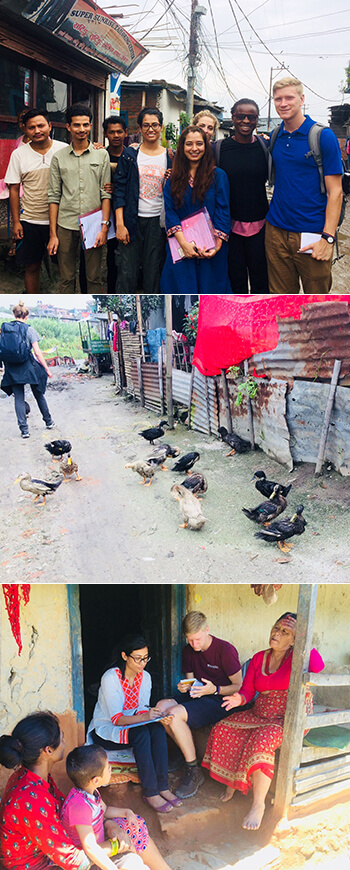 James Ferrara on Locust Walk.
James Ferrara on Locust Walk.
When James Ferrara, V’20, was 10 years old, his family’s Labrador retriever, Cody, suffered from arthritis and had to be put down. The experience sparked Ferrara’s interest in veterinary medicine. Initially, he’d hoped to help suffering animals, and over time he became interested in the intersection of animal and human health.
Ferrara brought this interest to Penn Vet. In August, he traveled to Kathmandu, Nepal, with two other Penn students, Akudo Ejelonu, a PhD student at Penn’s Population Studies Center, and Hanna Stambakio, a clinical researcher at Penn Medicine’s Urology Program.
 (Top) field site visit with Penn students, CMDN staff, and community members. (Middle) Jadibuti free-range ducks and temporary structures. (Bottom) Manisha Bista from CMDN and James Ferrara surveying a family in Panauti.
(Top) field site visit with Penn students, CMDN staff, and community members. (Middle) Jadibuti free-range ducks and temporary structures. (Bottom) Manisha Bista from CMDN and James Ferrara surveying a family in Panauti.
The team received the Penn Provost’s Fellowship for Interdisciplinary Innovation and partnered with the Center of Molecular Dynamics Nepal (CMDN), a nongovernmental biotechnology research organization based in Kathmandu. The award was to conduct baseline research on Campylobacter, a bacterium found in unpasteurized milk and animals’ digestive systems that causes campylobacteriosis, a potentially life-threatening infection.
“As a vet student, I understand disease dynamics in animals and how they impact humans,” said Ferrara of the team’s interdisciplinary approach. “Akudo studies demography, so the cultural aspects are right up her alley. Hanna is a clinical researcher in urology, and she’s in the environmental studies program, so she knows a lot about creating and conducting surveys. Things really come together when you get a lot of collaborators who are outside of your own field.”
In Nepal, little is known about Campylobacter. Campylobacteriosis is zoonotic, so the group employed a holistic perspective, conducting initial surveys to identify and understand risk factors.
Because of their reverence for cows, Nepalis don’t euthanize the animals when they’re sick. Instead, they isolate them for life, which can lead to disease transmission. Even if the cow is isolated, Campylobacter can travel via water runoff, infecting both human and animal drinking water.
Working with the CMDN, the team surveyed people in two areas, one urban and one rural, about their use of milk, animal husbandry, water treatment and consumption practices, and more. Based on assessments from this visit, Ferrara hopes to identify future research projects, interventions, and education programs to prevent the spread of campylobacteriosis and other zoonotic diseases.
“This trip was impactful for me,” said Ferrara. “And meeting and collaborating with Nepalese scientists and students was inspiring. CMDN is on the cutting edge of science, even with far fewer resources than we have here in the U.S. and at Penn Vet. Talking to Nepalis really opened my eyes about some of the early assumptions I had. For example, I assumed drinking raw-milk is a widespread practice, but I found the opposite. Except in specific cases, people boil milk before consuming it, whether it’s direct from the cow or purchased in a store. The needs are different than I might have expected.”
Ferrara has ambitious goals for the Nepal project. He envisions widespread public health education and disease-intervention projects in Kathmandu. He also wants to create a lasting partnership with CMDN and expand Penn Vet’s activities and relationships on the ground in Nepal.